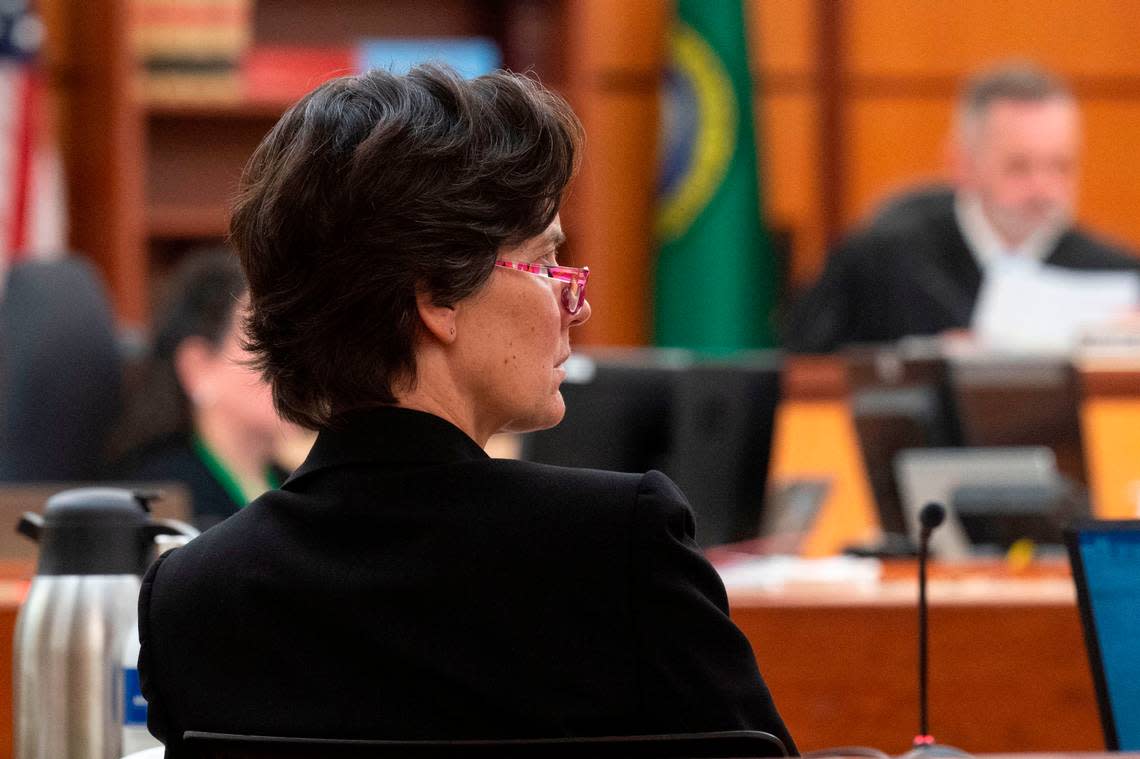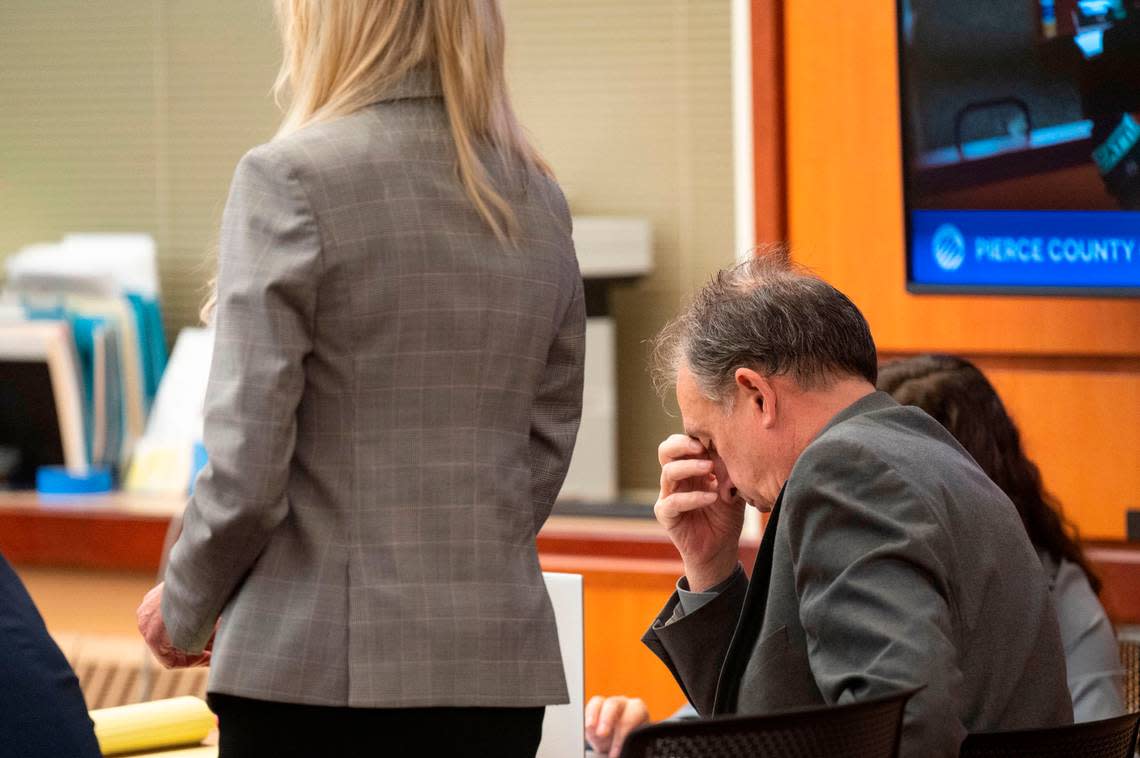Prosecutors grill sheriff on threat from newspaper carrier. When will case go to jury?
Prosecutors from the state Attorney General’s Office got their first shot at questioning Pierce County Sheriff Ed Troyer about his 2021 confrontation with a Tacoma newspaper carrier after he retook the stand Monday in his trial on false reporting charges.
Assistant attorney general Melanie Tratnik homed in on several apparent inconsistencies between Troyer’s testimony and a recording of his back-channel call to South Sound 911 dispatchers in which he reported a suspicious motorist threatened to kill him, which spurred a countywide distress call dispatching dozens to the scene.
The driver turned out to be his neighborhood’s newspaper carrier, Sedrick Altheimer, 26, a Black man who has denied threatening Troyer and alleged the sheriff racially profiled him.
Prior to the Attorney General’s Office charging Troyer with two misdemeanors last October in connection to the incident, the sheriff testified he declined multiple interviews with investigators on the advice of his attorneys.
Altheimer and Troyer have testified about at least two interactions around 2 a.m. on Jan. 27, 2021: One where Altheimer walked toward and spoke with Troyer, who was sitting in his Chevy Tahoe, and a second shortly thereafter where the two men’s cars were parked nose-to-nose while Troyer was on the phone with a dispatcher.
During the former, Troyer said he took an alleged statement from Altheimer of “I’ll take you out” as a death threat. Altheimer testified earlier in the trial he didn’t say that or threaten Troyer in any way.

At the beginning of cross-examination, Tratnik probed Troyer about the darkness at the scene, which he attributed to his inability to see certain details about the incident while still recalling other specifics, such as Altheimer’s muscles being “pumped up” during their first run-in.
Tratnik also pressed Troyer about the chronology of his call to dispatchers and what he observed Altheimer doing at various points during their second interaction.
Troyer testified that Altheimer was yelling at him while he was on the phone with dispatchers and they were both outside their cars. He said they got back in their cars when they heard police sirens.
Tratnik said the order of events didn’t fit.
Troyer also has testified that during the same nearly 5-minute call he and Altheimer were in a stare-down and that Altheimer was taking photos or videos of him. Altheimer testified he never got out of his car and got into a headlight “flashing battle” with Troyer while waiting for police.
After Troyer testified Altheimer “never came back at my car,” Tratnik asked why he told a dispatcher about halfway through his call that he was reversing to leave and Altheimer was pushing against his car.
“I might have been repeating what had happened,” Troyer said from the stand.
Tratnik said Troyer clearly told the dispatcher, “I’m still here,” gave the address of his second encounter with Altheimer and used the present tense to describe the situation.
“In the totality of the situation those all occurred during the same time period,” Troyer said.
Troyer agreed with Tratnik that he had enough room to leave the incident with Altheimer, contradicting his statements to the 911 dispatcher that he had Altheimer blocked in at one point and later being blocked in by Altheimer. He told the dispatcher he just wanted to be allowed to go home.
“We had each other blocked in,” Troyer testified earlier in the day in response to defense questions.
He told prosecutors he didn’t go home between his two interactions with Altheimer because he’d already phoned the dispatch line, and “I was obviously going to finish it out.” He added, “At that point, I was waiting for the cops to come.”
Prior to following Altheimer, Troyer has testified that he was in his bedroom when he spotted his car and thought it was suspicious. Tratnik asked Troyer why a Tacoma police report and body-worn camera footage indicate he told officers at the scene he’d been asleep beforehand.
“I just told him I was home,” said Troyer, attributing the discrepancy to miscommunication. “I had literally been home less than a minute.”
Tratnik later asked Troyer about his perception of “I’ll take you out” as a deadly threat, noting his testimony that he had a hard time hearing Altheimer and that the newspaper carrier also could have meant he wanted to fight.
“He was very upset, and I heard the part about taking me out,” Troyer testified during defense questioning.
Troyer told prosecutors if he got out of his car during his first run-in with Altheimer, “I would have been on the losing end of something.”
Troyer claimed he repeated his allegation about Altheimer threatening his life four times on the call to make sure the dispatcher documented it. He said law enforcement and dispatchers are trained to repeat information until it is acknowledged by the other party.
He said he used a back-channel line so he could talk directly with dispatchers about the alleged threat.
“That’s the fastest line I’ve been using for 22 years,” said Troyer, who testified he used it frequently to get information when he was the Sheriff’s Department spokesperson.
Troyer remained adamant during his testimony Monday that he never told Tacoma police officers that Altheimer did not threaten him. He said words like “backtrack” and “recant” were “invented by the Seattle Times” during its coverage of the incident.
The case could go to the jury as soon as Tuesday afternoon to determine whether Troyer is guilty of false reporting and making a false or misleading statement to a public servant in connection to his call. Both are misdemeanors. Each charge carries penalties of up to a year in jail and up to a $5,000 fine.
Attorneys will reconvene with Visiting Kitsap County Judge Jeffrey Jahns Tuesday morning to discuss the instructions for jurors to decide their verdict.

Testimony on 2015 complaint against Troyer allowed
During his testimony, Troyer repeatedly spoke beyond the scope of the questions asked of him by attorneys, prompting flurries of objections to stop him from speaking or strike his answers from the court record.
One such deviation during defense questioning Thursday opened the door for prosecutors to ask the sheriff about a 2015 complaint of harassment from a citizen, which was reported by KNKX. A pre-trial order had previously barred prosecutors from eliciting testimony about Troyer’s prior “wrongs” or “bad acts.”
Tratnik said defense attorneys had been allowed to paint Troyer as an “angelic person” for the jury while putting “Mr. Altheimer on trial.”
In the 2015 incident, a family member of a person who died in Sheriff’s Department custody messaged Troyer on his personal Facebook account, saying the involved deputies should be jailed, attorneys said in court. Troyer replied that he was going to contact the man’s employer after seeing he worked a security job alongside law enforcement.
When speaking about his complaint record last week, the sheriff rattled off a handful of categories, such as racism and excessive force, that had never been filed against him. But he also used the phrase “or otherwise” regarding the lack of complaints against him, which prosecutors argued was false. They also asserted the 2015 complaint impugned character evidence defense attorneys presented about his integrity as a “law and order” sheriff.
Troyer testified he took the message as a “threat.”
“I thought that they should be aware,” Troyer said about relaying the message to law enforcement agencies the complainant worked closely with.
Prosecutors said an uninvolved attorney who has been following the case online sent them information about the complaint last Friday, at which point they shared it with Troyer’s defense team.
The records mentioned nine complaints against Troyer, eight of which weren’t sustained, attorneys said. One complaint was sustained because Troyer didn’t change the oil in his department-issued vehicle on time.
